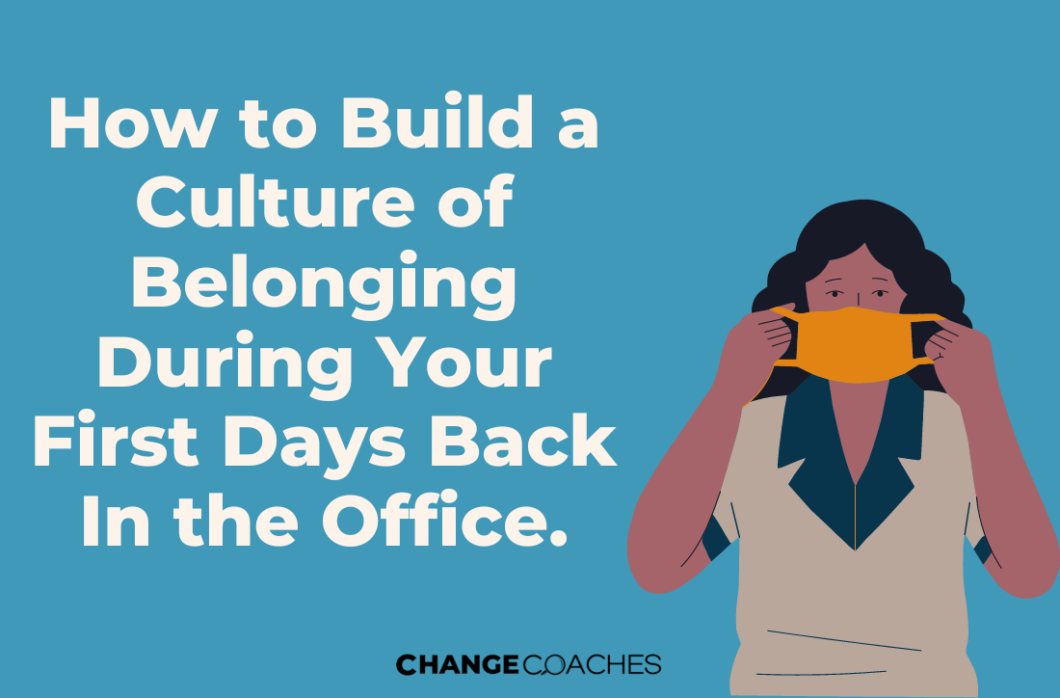Many senior leaders have already put some thought into navigating the imminent shifts that will hit as employees get vaccinated and begin to return to the physical work environment. On top of getting prepared for upcoming full days in the office, employees will be blanketed with numerous transitions including reverting back to daily commutes, making new arrangements for childcare, and dealing with other pandemic imposed life changes. As we learned from the big shift to remote work last March (and some of us learned the hard way), hearing our employees out, meeting their concerns with empathy, and providing them with support are all necessary steps for a successful transition. It might not be a smooth one—keep in mind that everyone is going to feel like a fish out of water for a while—and that’s okay.
What else do we need to keep in mind during this transition? How do we keep our culture intact? Here are four tips to guide your actions as you transition back on-site:
Plan a Listening Session
Before anyone even sets foot in the office, hold listening sessions to open up discussions about what to expect upon an office return. Your goal is to immediately install a climate of psychological safety so employees don’t shut down and stop communicating. And, remember to refrain from using these meetings as a space for tactical announcements. They are called listening sessions for a reason.
Revisit How You Define and Measure Productivity
As a direct result of working more hours in isolation, companies have actually found that their employees have been more productive while working remotely. However, this effect isn’t sustainable. People are burnt out and employees need your help to balance their schedules back out.
It’s time to revisit what productivity means. Let’s start with what it doesn’t mean: logging on in the early AM, staying connected all day long, and logging back in for several hours at night. This has to stop. If you agree, repeat it loud and clear to your entire team.
Infuse Equity into Your Org Policies
Over the last year, we were slapped with the reality that many standard workplace policies are far from equitable, especially for women and people of color. Now is the time to Build Back Better, and the first step is to understand how equitable your organization actually is.
You can start by asking yourself a few questions:
- What policies have proved to be inequitable over the last year?
- Are only a privileged few allowed to work from home?
- Do you have to “be physically seen” working a crazy amount of hours to be considered a “good performer?”
- Are you giving everyone access to flexible work schedules, or are these privileges reserved for a chosen few?
Your answers to these questions will reveal possible inequities that you may need to face in order to build back better.
Continue Reinforcing the Best Parts of WFH Culture
2020 pushed many of us to the edge. It forced us to confront things now that we may not have gotten to for decades during “non-pandemic” times. While it has been tough, it’s also important to acknowledge the positive benefits reaped during these times. Zoom meetings allowed us to be more personal with each other. We were suddenly able to do things that were unheard of, like meet each other’s family members during conference calls (if we choose). We became less judgmental about crying babies or barking dogs in the background. We discovered what’s truly important.
Don’t lose sight of these positive changes, and keep encouraging these same accepting experiences when your office returns to on-site work. Human connection is exactly what will carry us through these times—and keep your culture intact.
More big shifts are coming in 2021 and I’m convinced that we are ready for them. The key is building back better. Take the same approach that has proven effective during these fast-changing times: meet your employees where they are and continue to co-create your future together
Do you need some support with planning an equitable transition back to the office while keeping your culture intact? Let’s talk
LaTonya Wilkins, ACC, is an ICF-credentialed people, team, and culture coach. She is also a globally demanded keynote speaker and facilitator. LaTonya inspires her clients to think beyond training to create real change in organizations. You can learn more about LaTonya at changecoaches.io. To subscribe to LaTonya’s monthly newsletter, click here.

